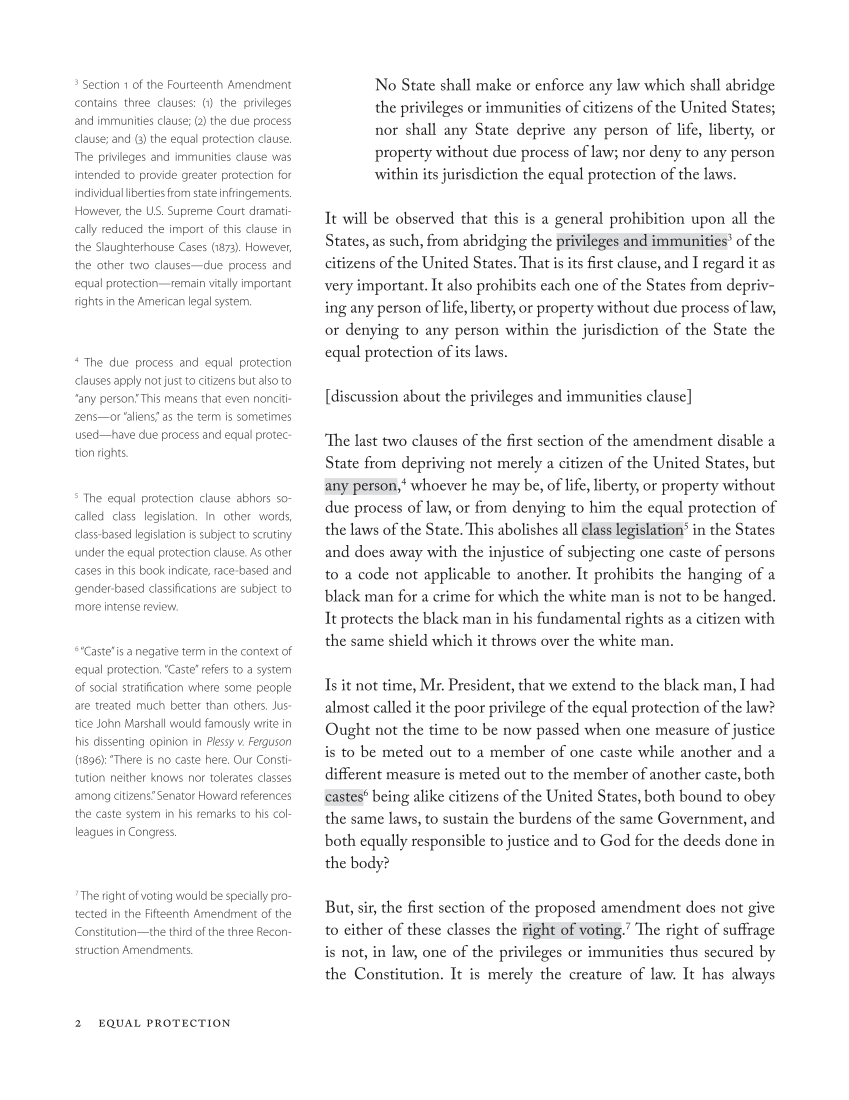2 Equal Protection No State shall make or enforce any law which shall abridge the privileges or immunities of citizens of the United States nor shall any State deprive any person of life, liberty, or property without due process of law nor deny to any person within its jurisdiction the equal protection of the laws. It will be observed that this is a general prohibition upon all the States, as such, from abridging the privileges and immunities3 of the citizens of the United States. That is its first clause, and I regard it as very important. It also prohibits each one of the States from depriv- ing any person of life, liberty, or property without due process of law, or denying to any person within the jurisdiction of the State the equal protection of its laws. [discussion about the privileges and immunities clause] The last two clauses of the first section of the amendment disable a State from depriving not merely a citizen of the United States, but any person,4 whoever he may be, of life, liberty, or property without due process of law, or from denying to him the equal protection of the laws of the State. This abolishes all class legislation5 in the States and does away with the injustice of subjecting one caste of persons to a code not applicable to another. It prohibits the hanging of a black man for a crime for which the white man is not to be hanged. It protects the black man in his fundamental rights as a citizen with the same shield which it throws over the white man. Is it not time, Mr. President, that we extend to the black man, I had almost called it the poor privilege of the equal protection of the law? Ought not the time to be now passed when one measure of justice is to be meted out to a member of one caste while another and a different measure is meted out to the member of another caste, both castes6 being alike citizens of the United States, both bound to obey the same laws, to sustain the burdens of the same Government, and both equally responsible to justice and to God for the deeds done in the body? But, sir, the first section of the proposed amendment does not give to either of these classes the right of voting.7 The right of suffrage is not, in law, one of the privileges or immunities thus secured by the Constitution. It is merely the creature of law. It has always 3 Section 1 of the Fourteenth Amendment contains three clauses: (1) the privileges and immunities clause (2) the due process clause and (3) the equal protection clause. The privileges and immunities clause was intended to provide greater protection for individual liberties from state infringements. However, the U.S. Supreme Court dramati- cally reduced the import of this clause in the Slaughterhouse Cases (1873). However, the other two clauses—due process and equal protection—remain vitally important rights in the American legal system. 4 The due process and equal protection clauses apply not just to citizens but also to “any person.” This means that even nonciti- zens—or “aliens,” as the term is sometimes used—have due process and equal protec- tion rights. 5 The equal protection clause abhors so- called class legislation. In other words, class-based legislation is subject to scrutiny under the equal protection clause. As other cases in this book indicate, race-based and gender-based classifications are subject to more intense review. 6 “Caste” is a negative term in the context of equal protection. “Caste” refers to a system of social stratification where some people are treated much better than others. Jus- tice John Marshall would famously write in his dissenting opinion in Plessy v. Ferguson (1896): “There is no caste here. Our Consti- tution neither knows nor tolerates classes among citizens.” Senator Howard references the caste system in his remarks to his col- leagues in Congress. 7 The right of voting would be specially pro- tected in the Fifteenth Amendment of the Constitution—the third of the three Recon- struction Amendments.
Document Details My Account Print multiple pages
Print
You have printed 0 times in the last 24 hours.
Your print count will reset on at .
You may print 0 more time(s) before then.
You may print a maximum of 0 pages at a time.


































































































































































































































































